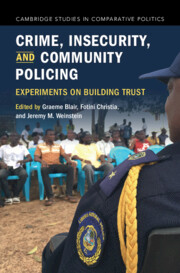Book contents
- Frontmatter
- Contents
- Contributors
- Acknowledgments
- Abbreviations
- Part I Crime, Insecurity, and Policing
- Part II The Effects of Community Policing
- 6 Meta-analysis of the Effects of Community Policing
- 7 Can Trust Be Built through Citizen Monitoring of Police Activity? Evidence from Santa Catarina, Brazil
- 8 Do Police–Community MeetingsWork? Experimental Evidence from Medellín, Colombia
- 9 Community Policing, Vigilantism, and the Rule of Law: Evidence from Liberia
- 10 Community Policing and Citizen Trust in Pakistan
- 11 Community Policing in the Philippines: Communication, Trust, and Service Provision
- 12 Restoring Police-Community Relations in Uganda
- Part III Reflecting on Community Policing
- References
- Index
- Series page
9 - Community Policing, Vigilantism, and the Rule of Law: Evidence from Liberia
from Part II - The Effects of Community Policing
Published online by Cambridge University Press: 09 December 2024
- Frontmatter
- Contents
- Contributors
- Acknowledgments
- Abbreviations
- Part I Crime, Insecurity, and Policing
- Part II The Effects of Community Policing
- 6 Meta-analysis of the Effects of Community Policing
- 7 Can Trust Be Built through Citizen Monitoring of Police Activity? Evidence from Santa Catarina, Brazil
- 8 Do Police–Community MeetingsWork? Experimental Evidence from Medellín, Colombia
- 9 Community Policing, Vigilantism, and the Rule of Law: Evidence from Liberia
- 10 Community Policing and Citizen Trust in Pakistan
- 11 Community Policing in the Philippines: Communication, Trust, and Service Provision
- 12 Restoring Police-Community Relations in Uganda
- Part III Reflecting on Community Policing
- References
- Index
- Series page
Summary
What is the effect of community policing in settings where the rule of law is weak and communities gripped by crime turn to vigilantism to deter and prevent crime? In this chapter, I test the effectiveness of the Liberia National Police’s model of community policing, which focuses not only on building citizens’ trust and cooperation but also on providing communities with an alternative to vigilantism via its Community Watch Forum initiative. Drawing on large-scale crime surveys and administrative data, I find that the program led to moderate improvements in perceptions of police intentions, norms of cooperation, and perceptions of police capacity. I also find that the program increased community contributions to local security groups, reduced support for mob violence, and reduced reports of actual mob violence incidents by 39 percent. Despite these improvements, the program had no significant effect on other forms of crime victimization, crime reporting, crime tips, or residents’ sense of security.
- Type
- Chapter
- Information
- Crime, Insecurity, and Community PolicingExperiments on Building Trust, pp. 257 - 306Publisher: Cambridge University PressPrint publication year: 2024

